Sharing courses as a consortium enhances curricular opportunities and provides a forum for our faculty and students to explore digitally-enhanced, collaborative modes for teaching and learning in the liberal arts. Browse below for the latest classes available to students in the LACOL network.
Category: Collaborations

Liberal Arts Lecture Exchange (hosted by LACOL)
| Liberal Arts Remote Lecture Exchange LACOL is hosting a Liberal Arts Lecture/Lesson Exchange. This concept was proposed by faculty at our member schools and is starting to roll out as a response to remote teaching needs.The exchange is open to the liberal arts community. Consider contributing! Liberal Arts Remote Lecture Exchange Post to the exchange: http://bit.ly/lac-remote-lesson-form View the list: http://bit.ly/lac-remote-lesson-exchange |
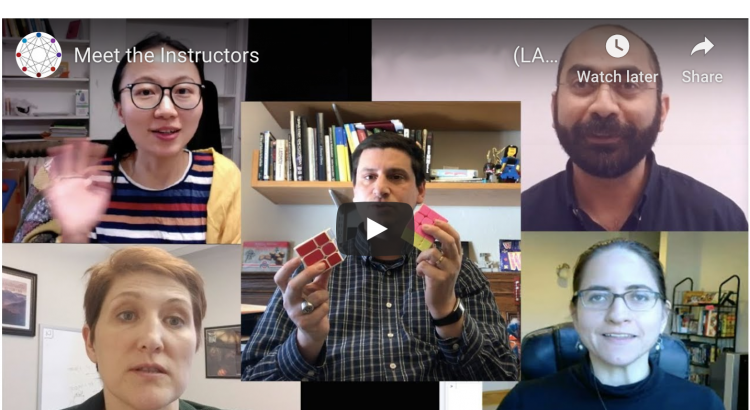
March 2020: Liberal Arts Remote Teaching (hands-on webinar)

Dates/Time for Live Sessions:
- Tuesday, March 17, 2020 – 1:00pm-2:00pm Eastern [FULL]
- Thursday, March 19, 2020 – 11:00am-12:00pm Eastern [FULL]
Sign Up: CLOSED
Handouts and Demo Gallery: http://bit.ly/lac-teach-webinar-report
Remote Teaching Tips: http://bit.ly/lacol-teach-online
This LACOL webinar shares hands-on practice with five experienced liberal arts teachers from Swarthmore College, Vassar College, Williams College, and Washington and Lee University. This team regularly collaborates to deliver online/hybrid classes for the liberal arts.
Description: Many liberal arts colleges are asking faculty to consider how they move their teaching online as part of emergency preparedness in the face of COVID-19 or other disruptions to regular classroom teaching. Tips and guides are circulating, and faculty get lots of support from their local IT and teaching and learning centers. Read More

Digital Agility and Liberal Arts – collab highlights on the EDUCAUSE Transforming Higher Ed
Digital Agility: Embracing a Holistic Approach to Digital Literacy in the Liberal Arts
A group of institutions is collaborating to identify what digital agility means in the liberal arts and to encourage the use of that definition to guide institutional initiatives that involve digital agility …
Spring 2020 – Shared courses in Upper Level Statistics
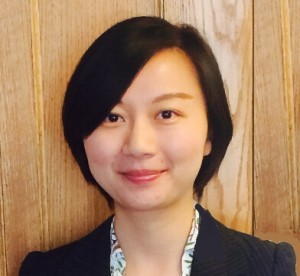
Shared LACOL Course: Data Confidentiality (MATH 301)
Instructor: Professor Jingchen (Monika) Hu, Vassar College
Topics and Objectives: Statistical agencies are under legal obligation to protect survey respondents’ privacy when releasing respondent-level data to the public. Statistical models could facilitate such release by introducing perturbation to the original, confidential data. How to develop suitable statistical models, and how to evaluate the privacy protection they produce, are the focus of this intensive.
Shared LACOL Course: Bayesian Inference with Python (MATH 399)
Instructor: Professor Jingchen (Monika) Hu, Vassar College
Topics and Objectives: We will focus on computational techniques using Python programming language to estimate various Bayesian models. In the end, students propose and complete a data analysis project of their interests and present it to the group.
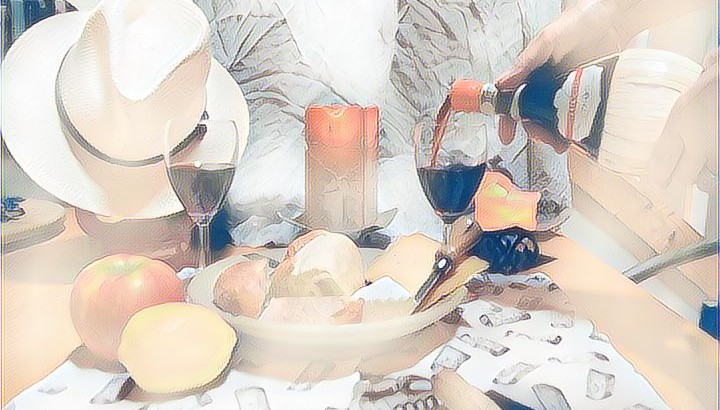
Introducing CHIANTI – language resources from LACOL
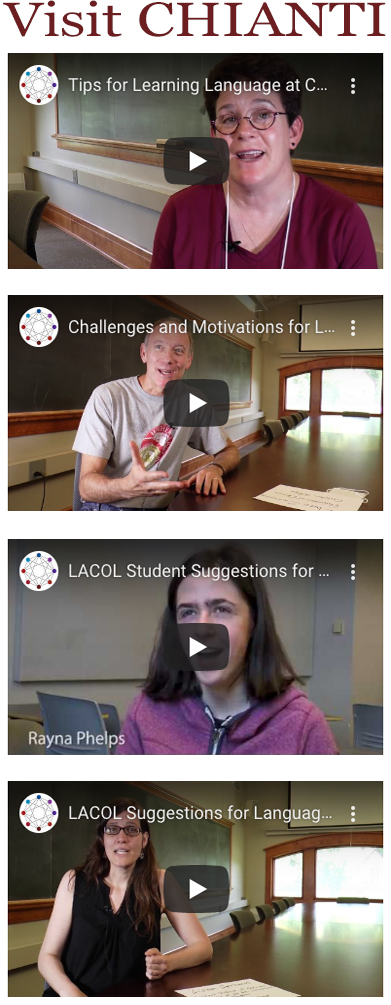 What are some of the biggest rewards of learning a second language? As a student, what do you know now that you wish you had known as you began learning your language at college? As faculty, what one piece of advice would you give to students as they are about to start their language learning at college? What are models or maps that integrate all aspects of language learning?
What are some of the biggest rewards of learning a second language? As a student, what do you know now that you wish you had known as you began learning your language at college? As faculty, what one piece of advice would you give to students as they are about to start their language learning at college? What are models or maps that integrate all aspects of language learning?
These are just some of the questions to be explored through CHIANTI (https://chianti.lacol.net) a new shared resource for students and teachers of language at the college level.
Over the past year, faculty and language learning experts from across LACOL have been collaborating to develop the CHIANTI concept and prototype. For students, an initial set of videos are posted that feature LACOL language instructors and students reflecting on the college-level language-learning experience. For language teachers, a self-curated online digital library of shareable tips and teaching resources is developing.
As an ongoing initiatve of the LACOL Language Instruction Working Group, the Chianti site and team invites contributions from LACOL language instructors in the areas of: General tips for college-level language learning, including research on adult second-language (L2) acquisition. 2) English grammar for L2 learners including models or maps that integrate all aspects of language, 3) Phonology, and 4) An interactive glossary of grammatical and linguistic terms from which instructors can draw for their own pedagogical purposes and to which they can contribute their own definitions and examples.
Go to CHIANTI
Summer Data Science Class – Gallery and Report (2019)
Student Data Science Video Gallery – Summer 2019
[9:05] A. Chunnananda (Vassar College), R. Hageboeck (Washington and Lee University)
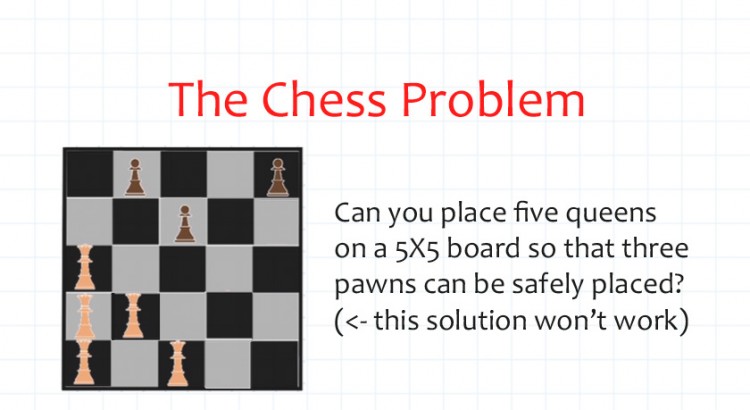
Operations Research – Shared Course Opportunity, Spring 2020
Shared LACOL Course: Operations Research
Instructor: Professor Steven J. Miller, Williams College
Enrollment Info for Students: http://bit.ly/ops-research (Fall 2019, Spring 2020)
Syllabus & Course Website: https://web.williams.edu/Mathematics/sjmiller/public_html/317Fa19
Course Flyer: Operations Research PDF
Topics and Objectives:
- The real world is complicated, requiring mathematicians to approximate solutions and even the statement of real world problems!
- While the chess scenario pictured above might appear to be a make-work problem, the efficient solution illustrates one of the most powerful ideas in mathematics, and allows us to tell in many cases how close we are to the optimal solution (even if we cannot find the optimal solution.)
- In this class, you will learn powerful methods from classical algorithms to advanced linear algebra and their applications to the real world, specifically linear programming and random matrix theory.
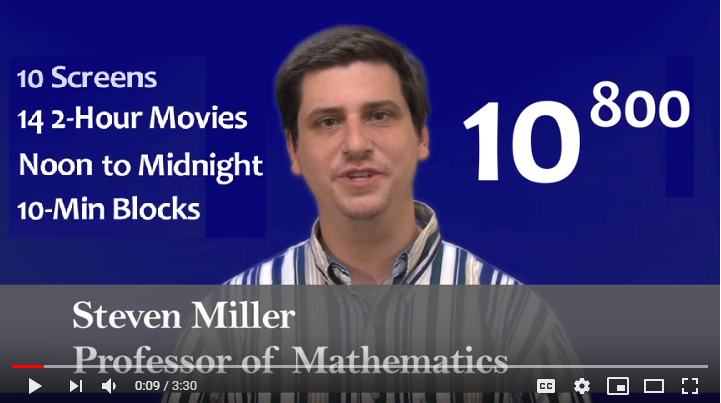
Online Modules for Quantitative Skills: Exploring Adaption and Adoption Across LACOL
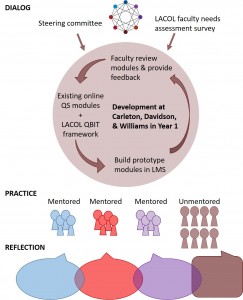 LACOL has been awarded an IUSE grant from National Science Foundation for a project titled, “Online modules for quantitative skill building: Exploring adaption and adoption across a consortium”. This three-year project will research the adaption and adoption of face-to-face and online pedagogies for teaching quantitative skills (QS) with the aim of improving understanding of best practices for the development of online modules to support students’ QS development.
LACOL has been awarded an IUSE grant from National Science Foundation for a project titled, “Online modules for quantitative skill building: Exploring adaption and adoption across a consortium”. This three-year project will research the adaption and adoption of face-to-face and online pedagogies for teaching quantitative skills (QS) with the aim of improving understanding of best practices for the development of online modules to support students’ QS development.
The project proposal was developed by Melissa Eblen-Zayas and Janet Russell of Carleton College and Laura Muller and Jonathan Leamon of Williams College based lessons learned from the QLAB pilot project.
Additional information about the project, including details about the project advisory board, a needs assessment survey for faculty, and opportunities for faculty and staff to get involved, will be be shared later this summer and into the fall through the QS Working Group Forum.
CLICK HERE TO SUBSCRIBE for ongoing news!
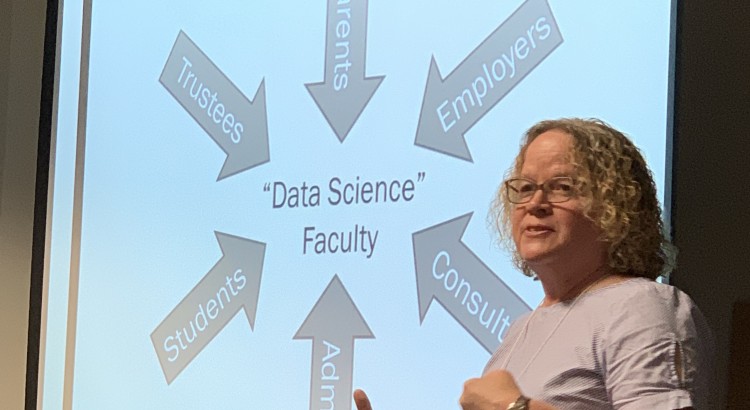
Data Science in the Liberal Arts Workshop (June 2019)
Event: Data Science in the Liberal Arts
Date & Location: June 6-7, 2019 at Washington and Lee University
Workshop Goals:
- Agenda & Program (Background and Purpose)
- Establishing a Think Tank on Data Science in the Liberal Arts
- Taking hands on approaches to curating, developing, and sharing liberal arts pedagogies and teaching materials for data science that broadly engage and support our students across the disciplines.
Attendees: members and friends of the LACOL DS+ working group
| Scroll down for workshop resources, slides, and video gallery |
Keynote Talk:
Data Journalism as a Liberal Art
Prof. Amelia McNamara
Department of Computer & Information Sciences
University of St. ThomasOne of the main ways the general public encounters products of data analysis is through journalism. Data journalists strive to explain complex stories using visualization, statistics, and heavy use of contextualization. As we incorporate data science into the liberal arts, data journalism provides a case study as a field in which the sciences and the humanities are consciously linked. In this talk, I’ll discuss the history of data journalism, how I see it fitting into a liberal arts framework, and experiences from a class I taught on data journalism.
More Workshop Talks and Resources:
1. R. DeVeaux – Data Science for All?
- BONUS TRACK: R. DeVeaux – Data Science Song ♫
- R. DeVeaux Slides
2. L. Heyer – Starting a Data Science Minor
Introduction to Data Science (shared course)
In Summer 2019 …
Introduction to Data Science (co-taught course, shared digitally)
Syllabus and FAQ: See course gateway
Learning Objectives:
- Familiarity and expertise in basic coding (R/RStudio).
- Understanding of theory and application of basic concepts in statistics.
- Ability to write and present technical material to diverse audiences.
Course Sequence:
- Intensive 8-week course with data lab component (fully digital)
- Student centered learning design including pre-recorded lectures, real-time lectures, and laboratory/supported work time
- Course co-taught by instructors from LACOL schools
- Delivery is fully online with some scheduled and some asynchronous events.
Course Team: see course gateway
Lightning Talk – Learn about this project in just 6.5 minutes!
Presented May 22, 2019 at the Bryn Mawr Blended Learning Conference
Course Topics Include: Read More
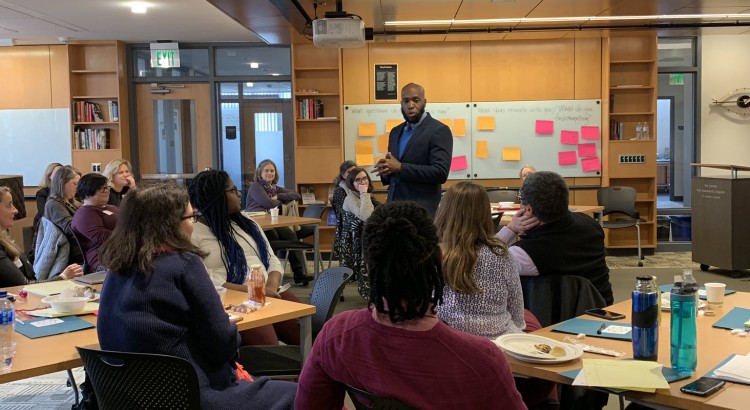
Cultivating Student Leadership in a More Inclusive Liberal Arts Classroom
Mini-Conference: Cultivating Student Leadership to Foster a More Inclusive Liberal Arts Classroom
Location: Amherst College Center for Teaching and Learning (Frost Library)
Date: April 5, 2019
Agenda: Student Leadership – April 5 Agenda
Invited Speaker: Bryan Dewsbury, University of Rhode Island
 Host: Amherst College Center for Teaching and Learning in partnership with Being Human in STEM and the Office of Diversity and Inclusion Read More
Host: Amherst College Center for Teaching and Learning in partnership with Being Human in STEM and the Office of Diversity and Inclusion Read More
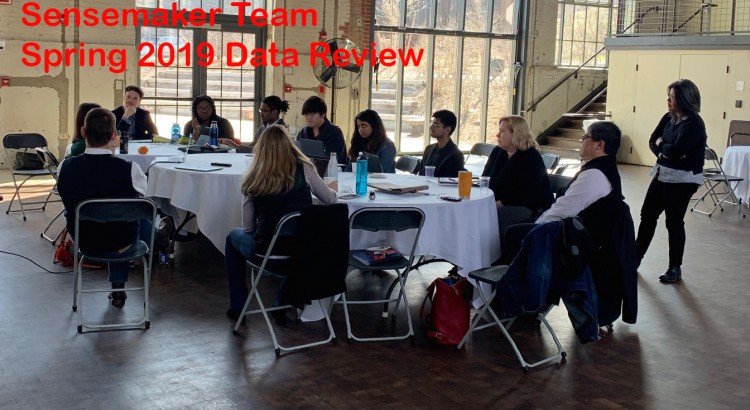
Sensemaker Team Data Review – April 4 at Amherst College
Event: Exploring Complexity through Student Micro-Narratives with Sensemaker
Host: Sensemaker Team Leads (Kristen Eshleman, Brent Maher, Annie Sadler, Paul Youngman)
Date: April 4
Time: 1:00pm-5:00pm (optional group lunch at 12:00pm; details tba)
Location: The Powerhouse, Amherst College
Attendees: Sensemaker Teams (Davidson, Hamilton, Haverford, Washington & Lee)
Sensemaker: http://lacol.net/category/collaborations/projects/inclusive-pedagogies
Project Website: http://emergentedu.org
Language Instruction Jam 2019
 Event: Language Instruction Jam
Event: Language Instruction Jam
Location: Bryn Mawr College, Canaday Library
Date: March 23-24
Agenda: Language Jam Agenda
Attendees: Language Instruction working group and project teams
Full agenda & highlights:
- CHIANTI: Ample time devoted to collaborative workshopping on CHIANTI, the shared teaching resource for college-level language instruction; participants will explore the resources that have been gathered so far (including student and faculty reflection videos on liberal arts language learning), brainstorm on ideas for the emerging platform, and work on building additional content.
- SKILLS DASHBOARD: Demonstration and brainstorming on the language skills question bank and dashboard prototype – initially developed for French last year, with future possibilities for other languages.
- DIGITAL TOOLS for LANGUAGE LEARNING: Colleagues across LACOL shared experiences with digital pedagogies and tools for language instruction.
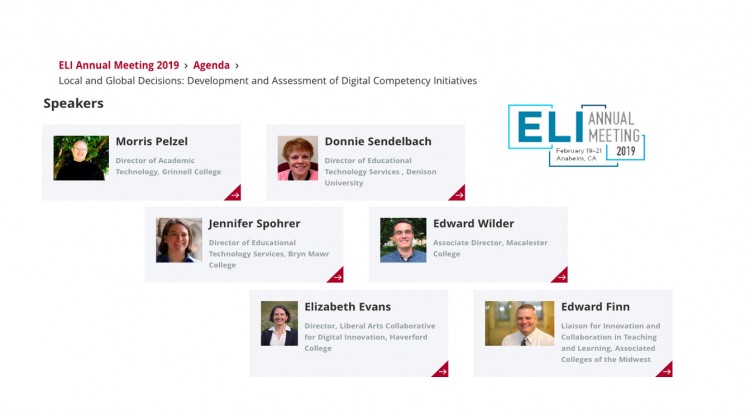
Local and Global Decisions: Digital Competency Initiatives, Development and Assessment
Event: Pre-Conference Liberal Arts Workshop at ELI (Session)
Title: Local and Global Decisions: Digital Competency Initiatives, Development and Assessment
Date: February 19, 2019
Venue: EDUCAUSE ELI Annual Conference
Location: Anaheim, California
Registration: Opens Nov 5
Time: 8am-11am PT
Facilitators:
- Donnie Sendelbach, Director of Educational Technology Services, Denison University
- Jennifer Spohrer, Director of Educational Technology, Bryn Mawr College
- Mo Pelzel, Director of Academic Technology, Grinnell College
- Ted Wilder, Associate Director of Information Technology, Macalester College
- Liz Evans, Director of Liberal Arts Collaborative for Digital Innovation (LACOL)
- Ed Finn, Liaison for Innovation and Collaboration in Teaching and Learning, Associated Colleges of the Midwest (ACM)
Abstract: Digital competency initiatives begin from shared global objectives but must adapt to local culture and structures to succeed. Collaboration helps define needs and goals, but how can we collaboratively assess programs that adopt intensely local variations? In this pre-conference workshop, we will present multiple examples of program development with overlapping goals. After examining existing efforts on attendees’ campuses, they will develop plans for their own initiatives, considering local circumstances. We will then brainstorm with participants about how to collaboratively assess the impact of digital competency initiatives. Moreover, we will determine what evidence of impact would be meaningful to different stakeholders.
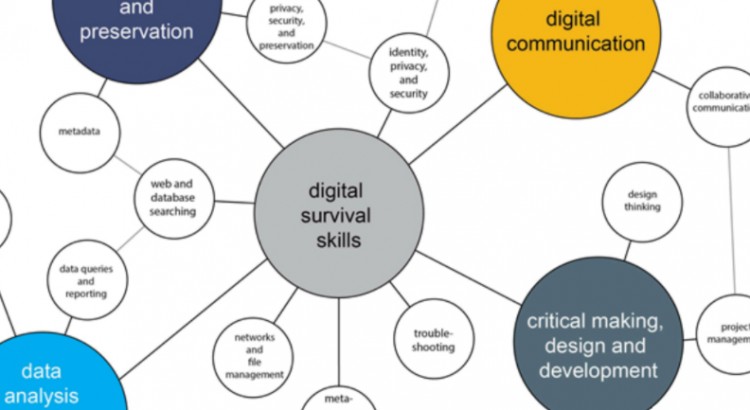
Digital Competencies Working Group
The LACOL Digital Competencies Working Group has formed to build on prior work related to Digital Competencies, Digital Studies, Digital Fluency, and Digital Literacy. These terms cover a group of related concepts, all of which reflect concepts and skills that are vital to the 21st Century learner and citizen … what we might call Digital Agility.
New Publication:
Digital Agility: Embracing a Holistic Approach to Digital Literacy in the Liberal Arts
by Beth Bohstedt and Sundi Richard (Jan 8, 2020, EDUCAUSEreview, Transforming Higher Ed.) This post, co-authored by Sundi and Beth, developed out of ongoing working group discussions in 2019.
The goals of the working group are to make concrete progress on ideas develop at the 2017 Think Tank and 2018 discussions. LACOL members are invited to join the group; reach out for more information!
- Group members include faculty, librarians, technologists, instructional designers.
- A top priority is adjusting the language of the Bryn Mawr Framework to fit individual/collective needs of our schools. Major elements of the Bryn Mawr framework are:
- Digital Survival Skills
- Digital Communication
- Data Management and Preservation
- Data Analysis and Presentation
- Critical Making, Design and Development
- Another priority is developing a shared survey of recent grads on their acquisition, use, and needs for digital competencies.
- Some in the group will engage with liberal arts research around competencies that are critical to the future of work – what fits and what are the disconnects?
- These ingredients will be used to engage with faculty more deeply in student-centered digital competency conversations and collaborations.
Roadmap:
JANUARY 2019 – Create a statement about using the Bryn Mawr Digital Competencies Framework as the starting point for developing institution specific frameworks. Read More



